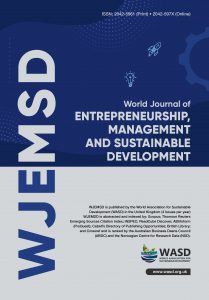Effect of Leadership Styles on Employees’ Performance by Considering Psychological Capital As Mediator: Evidence from Airlines Industry in Emerging Economy, Dr. Shaista Khan, Dr. Aamir Rashid, Dr. Anji Benhamed, Dr. Rizwana Rasheed and Zille Huma
 Dr. Shaista Kamal Khan
Dr. Shaista Kamal Khan
Senior Lecturer, Bahria University Karachi Campus
Pakistan
Email: shaistakamalkhan@gmail.com
Dr. Aamir Rashid
Faculty of Business and Management, Universiti Sultan Zainal Abidin, Kuala Terengganu, 21300, Malaysia
Faculty of Business Administration, Iqra University, Karachi, 75500, Pakistan
Email: qaboola10@yahoo.com
Dr. Anji Benhamed
Lecturer in Entrepreneurship, Business Faculty
Higher Colleges of Technology
UAE
Email: Anjibenhamed@gmail.com
Dr. Rizwana Rasheed
Assistant Professor, Faculty of Business Administration, Iqra University, Karachi, 75500
Pakistan
Email: rizwana.rasheed@iqra.edu.pk
Ms. Zille Huma
Department of Business Administration, PAF KIET University
Pakistan
Email: Huma_sheraz@hotmail.com
Purpose- This study explores the different types of leadership styles and how they influence the employee’s performance through the mediation of psychological capital factor. The present work examines the leadership styles attributes and investigates the most efficient style in achieving higher employee’s performance.
Design/methodology/approach- A hypothetical model and a quantitative approach were used through structural equation models (PLS SEM) in a population sample of 98 Pakistani employees working in an airline company to develop a conceptual model of leadership styles and its impact on the employees’ performance with the mediation role of psychological capital factor. The data was collected using snowball sampling method.
Findings- The empirical study identifies three categories of variables: Transactional leadership, transformational leadership, and laissez-faire leadership as key styles of leadership that significantly might impact employees’ performance. Psychological capital variable was considered as a mediator in the proposed model. The obtained results indicate a significant and positive impact of transactional leadership and transformational leadership on employee’s performance with a significant mediating role of psychological capital. However, laissez-faire leadership related data has proven that there is no significant effect of this variable on the employee performance considering the mediating effect. Our findings widen the scope of knowledge of each leadership style and rationalize how and why such styles with the mediation effect of psychological capital impact employee’s performance in the context of airlines companies.
Originality- Many studies discuss the leadership styles model and consider its dimensions for identifying a unique path to increase the employee’s performance. A shifting style occurs when managers want to change their approach in dealing with employees and move beyond work effectiveness to achieve higher organizational performance. Although this relation is well-established in the literature, the mediating factor related to psychological capital have not received enough attention particularly in the context of airlines companies. This study fills this gap and calls for more in-depth investigations on this area to better understand the dynamics of the relation between leadership styles and employees’ performance from a mediating effect perspective.
Keywords: Leadership Styles, Employees Performance, Positive Psychological Capital, Mediating Effect, Structural Equation Model.

